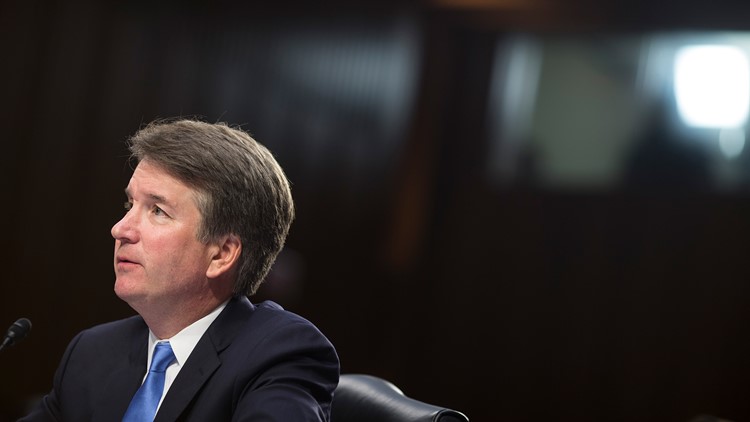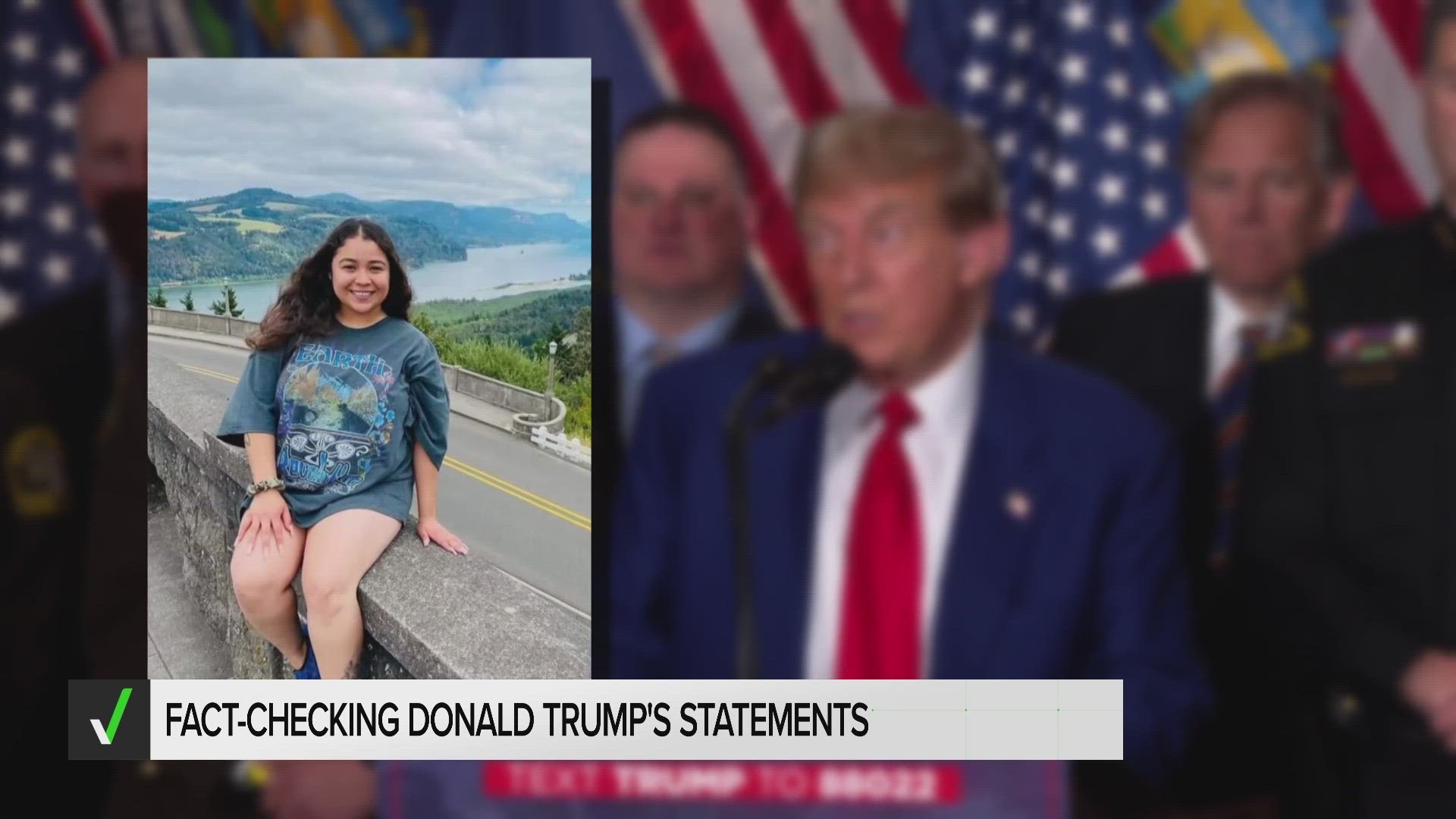He was drunk, she says, at a high school house party in Maryland when he tried to rape her.
Behind a locked door, he pinned her to a bed, pressing his body against hers as he tried to undress her. She recalls the way he put his hand over her mouth to keep her shouts from being heard above the music.
More than 30 years have passed since that alleged attack in the summer of 1982, but Christine Blasey Ford finally mustered the courage to make her allegations in a confidential letter in July to Sen. Dianne Feinstein, D-California.
The high school boy who attempted to rape her, she says, was Brett Kavanaugh.
He grew into a man whose name was put on a short list of nominees for the U.S. Supreme Court. In the weeks after Blasey Ford wrote that confidential letter, President Donald Trump named Kavanaugh as his choice. Confirmation hearings began soon after.
Though he denies the allegations, Kavanaugh's nomination remains in limbo. The Senate Judiciary Committee has called on Blasey Ford to testify as early as this week.
The question that now swirls on social media and hangs on the lips of lawmakers, pundits and TV newscasters is this: Why did she wait so long to tell?
"Why didn’t somebody call the FBI 36 years ago?” Trump asked in an interview with Fox News host Sean Hannity before a rally Thursday night in Las Vegas.
President Donald Trump on Thursday called his Supreme Court nominee Brett Kavanaugh a "high quality person." Christine Blasey Ford accused Kavanaugh of a decades-old sexual attack as Republicans try to push his nomination through the Senate. (Sept. 21) AP
"I have no doubt that, if the attack on Dr. Ford was as bad as she says, charges would have been immediately filed with local Law Enforcement Authorities by either her or her loving parents. I ask that she bring those filings forward so that we can learn date, time, and place!" Trump added in a Friday morning tweet.
Even in this #MeToo age of enlightenment, when thousands of people around the globe are sharing their stories of sexual assault and harassment, thousands more have deemed the cost of speaking up about sexual assault too high.
They took to Twitter on Friday using the hashtag #WhyIDidn'tReport to spell out why they didn't tell. In graphic detail, many laid out how they had already paid plenty at the hands of their assailants and a society that all too easily blames the victim.
Blasey Ford has paid, too.
Though she initially came forward anonymously, her name was leaked to the press. Her reputation, character and integrity have been questioned. The FBI is investigating death threats against her, and her family had to move from their home to ensure their safety.
"There is a penalty" for telling, said Kimberly Hurst, founder and executive director of Wayne County SAFE, the organization that works with survivors of rape and sexual assault in Wayne County, collecting forensic rape kit evidence, and supporting survivors with counseling and advocacy. "That penalty could be friendships. That penalty could be family members, when telling destroys relationships. It could be your job when it happens in a work environment."
President Donald Trump took to Twitter to question why it took Christine Blasey Ford so long to come forward with sexual assault allegations against Judge Brett Kavanaugh. (Photo: Shamus, Kristen Jordan, )
"To think women coming forward have anything to gain from this," is ridiculous, Hurst said. "There’s not some big money pot that anybody is getting from this. A lot of the women are going to end up suffering."
Oftentimes, they're also afraid they won't be believed. There are so many examples when those fears were realized.
Anita Hill wasn't believed when she testified before the Senate Judiciary Committeebefore the confirmation of Clarence Thomas to the U.S. Supreme Court.
Anita Hill testifies before the Senate Judiciary Committee on Oct. 11, 1991. (Photo: John Duricka/AP)
And in the run-up to the 2016 presidential election, "that's exactly what happened with Donald Trump," Hurst said, when more than a dozen women who came forward with sexual assault allegations were dismissed even after the "Access Hollywood" video surfaced showing Trump bragging about preying on unsuspecting women.
"That's exactly what's happening now with Brett Kavanaugh, and it's exactly what happened with Larry Nassar and Bill Cosby. Over and over and over we still see this pattern, and people don't get it."
Blanche Cook, a Wayne State University law professor who specializes in sex trafficking, workplace harassment and the commercialization and exploitation of women and girls, said America's rape culture is at the root of it.
"This woman is saying, 'This man tried to sexually assault me.' And we say, 'No, no, no, no, no. You’re the problem. You waited too long. You’re a liar. You’re trying to sabotage his career,' " Cook said.
"We have incredible rates of sexual assaults and sexual violence toward women. ... Denial keeps it in place and victim blaming keeps it in place. Victim blaming is very, very necessary to perpetuation of a rape culture."
At least 1 in 6 American women will be sexually assaulted in their lifetime, according to RAINN, which stands for the Rape, Abuse & Incest National Network, and is the nation's largest anti-sexual violence organization. But because so many people don't report their assaults, it's hard to know the true prevalence of the problem. Men aren't immune to sexual violence, either. RAINN estimates 1 in 33 men will be sexually assaulted in their lifetime.
"When we talk about rape culture, a huge piece of that is self-blame and shame," Hurst said. "That somehow, they should have been able to stop it from happening or that they should have been able to prevent it from happening. ... Asking themselves, 'What did I do to suggest that this was OK?' Makes it really hard for people to come forward.
"In other cases, it may be that they don't even fully see themselves as the victim.
"This happens to people in all walks of life at all ages — whether it was an attempted sexual assault, a completed sexual assault."
That rape culture, Cook said, stems from a centuries-long history that allowed women — and their bodies — to be treated as the property of men.
And though women now have the right to vote, to own property and are edging their way toward more equality, male dominance continues to permeate American ideology, Cook said. For example, we would never ask a man whose house was burglarized on a hot summer day why he opened up his screen door.
"But when women are sexually assaulted, we ask why was her skirt so short? Why was she out so late? Why was she drinking in the first place?" Cook said. "That’s because we actually respect physical property more than we do the bodies of women."
That's especially true when the perpetrator is in a position of power, Hurst said.
Kimberly Hurst, founder and executive Director of Wayne County SAFE, poses on Thursday, March 30, 2017, at the Wayne County Safe office in Detroit. (Photo: Rachel Woolf, Special to the Free Press)
"If it is a situation with somebody older or a coach or a priest or others in these positions of power, the threat is made: If you say something, no one is going to believe you. They're going to believe me over you."
Blasey Ford is a university professor now, Hurst said. "Does she really need a PhD to be credible, to be believed? I shouldn't have to have my doctorate to be believed when I say I was sexually assaulted."
Rather than asking Blasey Ford, "What took you so long?" we ought to ask, "What makes the story any less true than it was 36 years ago?" Cook suggested.
"Was it true 30 years ago?" she asked. "Then it’s still true now. The passage of time has nothing to do with the truth of the story. Let’s say you were born 30 years ago. ... The passage of time does not put your birth in doubt, but when we start talking about rape, oh, the passage of time puts the story in doubt."
Supreme Court nominee Brett Kavanaugh is sworn in for his confirmation hearings, Sept. 4. Saul Loeb/AFP/Getty Images Supreme Court nominee Brett Kavanaugh is sworn in for his confirmation hearings, Sept. 4, 2018, Washington, D.C.
Asking the question "Why did she wait so long" places the blame on Blasey Ford, Hurst noted.
"That is what some individuals are trying to do here," she said. "They're not holding (Kavanaugh) accountable for what she's saying occurred. ... This discussion is around: But it happened so long ago. Why is it an issue now? Why is she even bringing this up now? And this is so common."
What's lost in this conversation is that often the only power sexual assault survivors wield is the ability to choose when — or whether — to tell. By demanding an answer to the question of "Why didn't you tell sooner?," we strip Blasey Ford of her very last shred of control in a powerless situation.
Perhaps the best answer to the question of "Why did you wait so long to tell?" is to put ourselves in her place — and in the place of myriad other survivors of sexual assault.
Do you remember what it was like to be 15 years old? Or 12? Or 17?
Would you rush to tell your parents that you were at a party where kids were drinking beer? Would you be afraid you'd get in trouble with police if they were to learn about the underage drinking? If you said you were assaulted, would you worry about being branded a whore or a tramp among the other kids at school?
Maybe you would even feel as if it was partially your fault. You shouldn't have been at that party or taken a sip of that beer. Or maybe you shouldn't have walked home alone from school. Or worn a tank top. Or accepted a ride from that cute boy in chemistry class. Or trusted your uncle or your dad's best friend when he said he just wanted to tuck you in that night.
It's possible that you talked yourself into believing for a while that it wasn't so bad or that it didn't happen at all.
Until, that is, you could no longer deny that it did.
Until the price of not telling was too high.
Until you realized that the boy who did this to you is now poised to make judicial decisions that could affect millions of 15-year-old girls, their sisters, their mothers and their best friends.
And then, perhaps, the price to be paid is worth it.
Contact Kristen Jordan Shamus: 313-222-5997 or kshamus@freepress.com. Follow her on Twitter @kristenshamus.
►Make it easy to keep up to date with more stories like this. Download the 13 ON YOUR SIDE app now.
Have a news tip? Email news@wzzm13.com, visit our Facebook page or Twitter.



